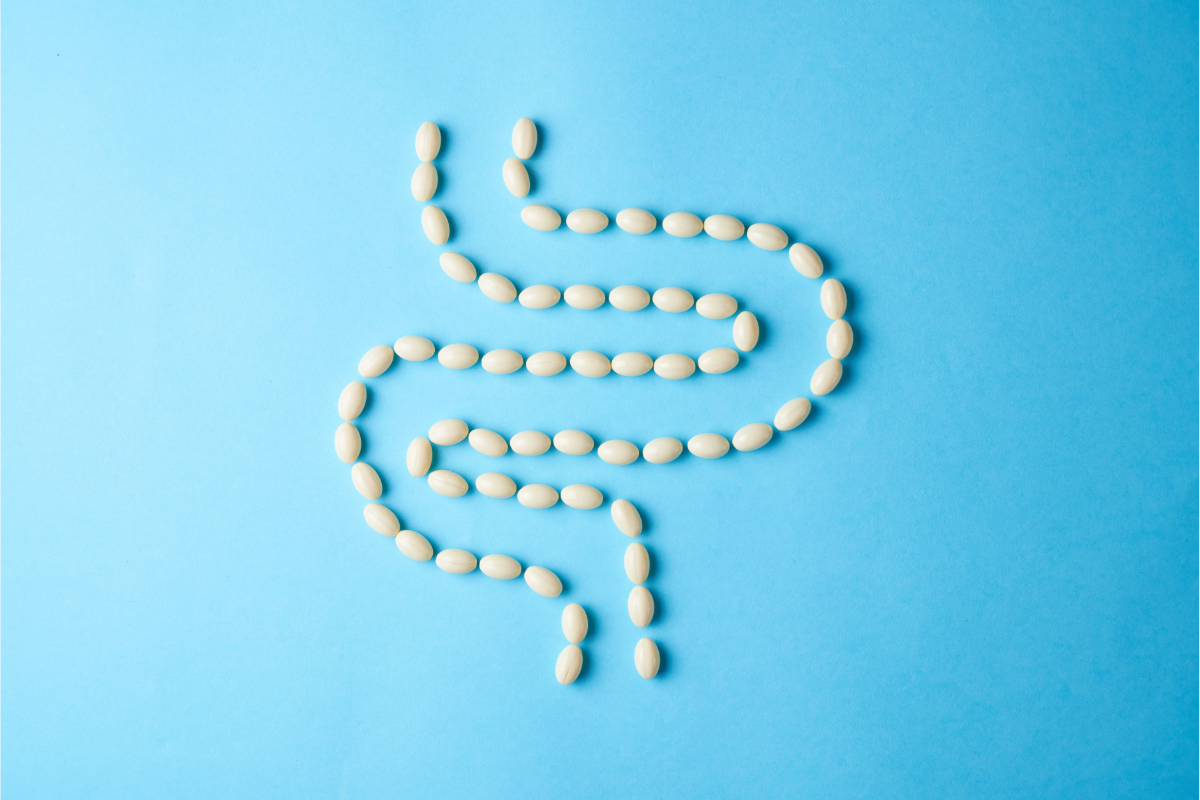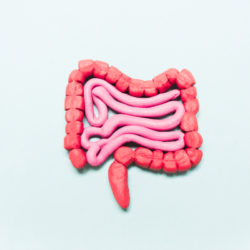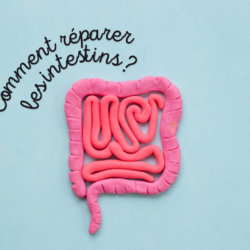Intestinal permeability, often referred to as ‘leaky gut’, is an increasingly studied concept in the field of gastroenterology and integrative medicine. This condition refers to a state in which the intestinal barrier, normally impermeable to certain substances, becomes more permeable. The intestinal barrier includes surface mucus, an epithelial layer and immune defences. Its main function is to control the passage of elements from the intestinal lumen into the bloodstream, thereby regulating the absorption of nutrients and protecting against harmful substances.
Disturbances to this barrier result from increased paracellular transport, apoptosis or transcellular permeability. The functions of the barrier can be tested in vivo by administering probe molecules orally or in vitro using biopsies of the human mucosa. Assessing intestinal barrier function beyond the epithelial layer is essential for a complete understanding.
Recent studies have shown that stress factors such as endurance exercise, administration of non-steroidal anti-inflammatory drugs, pregnancy and surfactants (such as bile acids and certain dietary factors such as emulsifiers) can increase intestinal permeability. These disturbances can be reversed by dietary factors, underlining the importance of diet in managing intestinal permeability. Although inflammatory or ulcerative diseases of the intestine result in increased intestinal permeability, none of these diseases can be cured simply by normalising the function of the intestinal barrier. There is as yet no evidence that restoring barrier function can improve the clinical manifestations of gastrointestinal or systemic disease, but clinicians need to be aware of the potential for barrier dysfunction in gastrointestinal disease and of the barrier as a target for future therapies. (4)
In this article, we dive into the details of this fascinating phenomenon, exploring the causes, consequences and ways to repair the intestinal barrier to maintain optimal health.
Understanding the intestinal barrier
The intestinal barrier plays a crucial role in our overall health, acting as a selective gatekeeper that regulates the absorption of nutrients and protects against harmful substances.
Structure and function of the intestinal barrier
The intestinal barrier is a multilayered structure located on the surface of the intestinal mucosa of the gastrointestinal tract. To perform its main functions as a physical and immunological barrier, several components of this barrier act in concert. It includes the layer of epithelial cells, the tight junctions between these cells, and a layer of mucus that protects against pathogens and facilitates the movement of food. Tight junction proteins, such asoccludin, claudins and zonula occludens, play a crucial role in maintaining the integrity of the epithelial barrier. (1)(2)
Biological mechanisms of intestinal permeability
The mechanisms regulating the integrity of the intestinal barrier are complex and involve a series of intracellular and extracellular signals. These mechanisms dynamically modulate tight junction protein complexes to allow the transport of essential molecules and restrict harmful substances. An imbalance in these regulations leads to a compromise in the integrity of the barrier, which is linked to various pathological conditions such as inflammatory bowel disease, obesity and metabolic disorders.
Factors that can alter the intestinal barrier
Several factors can alter the function of the intestinal barrier. Among these, environmental and physiological stresses, including the use of non-steroidal anti-inflammatory drugs, physical exercise and conditions such as pregnancy, generally reduce the function of the barrier. These effects can be reversed by supplements such as zinc or glutamine, which improve the barrier. Other dietary factors beneficial to the barrier include vitamins A and D, tryptophan, cysteine and fibre. Conversely, ethanol, fructose and food emulsifiers increase permeability. The effects of prebiotics on barrier function are modest, while probiotics exert direct and indirect antagonism against pathogens. Various studies show the effects of probiotics on barrier function, notably in vitro, in vivo in animals, and in randomised clinical trials in humans in response to stress or disease. (3)
Consequences of a damaged intestinal barrier
Recent research highlights the crucial importance of the intestinal barrier and its permeability for health and disease. However, the terms ‘intestinal barrier’ and ‘intestinal permeability’ remain poorly defined, and their assessment and clinical significance are the subject of debate.
Link between intestinal permeability and various pathologies
- Autoimmune and inflammatory diseases: A damaged intestinal barrier is associated with various inflammatory and autoimmune diseases. Translocation of luminal components into the host can trigger inflammatory reactions, contributing to the development and progression of diseases such as Crohn’s disease, coeliac disease, food allergy, irritable bowel syndrome, obesity, metabolic diseases and, more recently, neurodegenerative and cardiovascular diseases. (5)(6)
- Digestive disorders: Increased permeability is observed in most patients with Crohn’s disease and in 10-20% of their clinically healthy relatives. This abnormal permeability may be amplified by the administration of aspirin. Permeability measurements in patients with Crohn’s disease reflect the activity, extent and distribution of the disease, and can predict the likelihood of recurrence after surgery or medical remission. Permeability is also increased in coeliac disease and by factors such as trauma, burns and non-steroidal anti-inflammatory drugs. (7)
Discussion based on recent studies
Current evidence highlights the key role of the intestinal barrier in the prevention and treatment of disease. This barrier represents a vast mucosal surface where billions of bacteria face our body’s largest immune system. On the one hand, an intact intestinal barrier protects the human body against the invasion of micro-organisms and toxins; on the other, it must be open to absorb essential fluids and nutrients. Opposing objectives are achieved by a complex anatomical and functional structure, the functional state of which is described by “intestinal permeability”. The means of assessing intestinal permeability vary enormously and probably evaluate different functional components of the barrier. Assessments of the barrier are further complicated by the natural variability of this functional entity as a function of species and genes as well as diet and other environmental factors. (5)
Diagnosing intestinal permeability problems
Diagnosing intestinal permeability problems requires a careful and precise approach, involving specific tests to identify dysfunctions and determine appropriate treatment measures.
Current diagnostic methods
Methods for diagnosing intestinal permeability vary, but generally focus on assessing the function of the intestinal barrier. These methods include ex vivo and in vivo tests, using various biomarkers and analytical techniques. In France, in vivo testing may involve the use of biomarkers of epithelial injury such as citrulline (in plasma), zonulin (in serum), and claudins 3-4 (in urine). Zonulin, in particular, is known to cause disorganisation of intercellular tight junctions and alter intestinal permeability. An increase in its levels can be observed in the serum of patients suffering from certain pathologies, such as active coeliac disease or type 1 diabetes. (8)
Available biomarkers and tests
Biomarkers such as calprotectin (in stools) are also used to assess intestinal micro-inflammation, although this biomarker is not specific. Zonulin is also used as a biomarker, but it is important to note that its serum level does not necessarily reflect the local concentration in the intestine, and that it is a precursor of haptoglobin 2, a non-specific marker of systemic inflammation. A specific antibody is therefore needed to distinguish these two proteins and make zonulin a reliable biomarker of intestinal permeability.
These methods and biomarkers can be used to assess intestinal permeability, although various factors can influence the results and some methods require further validation before they can be widely used clinically.
- https://pubmed.ncbi.nlm.nih.gov/37606514/
- https://pubmed.ncbi.nlm.nih.gov/30115904/
- https://pubmed.ncbi.nlm.nih.gov/33492118/
- https://pubmed.ncbi.nlm.nih.gov/31076401/
- https://pubmed.ncbi.nlm.nih.gov/25407511/
- https://pubmed.ncbi.nlm.nih.gov/37505311/
- https://pubmed.ncbi.nlm.nih.gov/10980980/
- https://www.ipubli.inserm.fr/bitstream/handle/10608/8881/
- https://pubmed.ncbi.nlm.nih.gov/27812084/
- https://pubmed.ncbi.nlm.nih.gov/36615829/
- https://pubmed.ncbi.nlm.nih.gov/30883471/
- https://cdhf.ca/fr/comment-lalimentation-peut-elle-favoriser-la-sante-intestinale-et-le-systeme-immunitaire/
- lanutrition.fr
- https://www.biron.com/fr/centre-du-savoir/parole-de-specialiste/stress-gastro-intestinal/
- Fiber Fueled; Will Bulsiewicz, MD.
- https://zoe.com/





